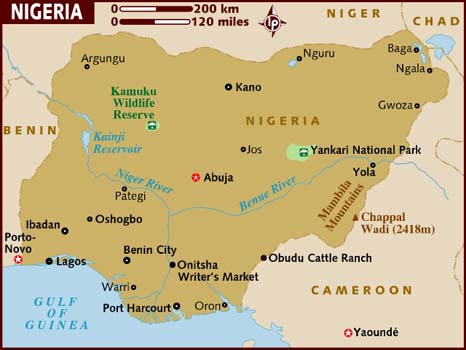Nigeria’s economy stagnates
February 13, 2019 | Expert Insights
Promises by Nigerian presidential candidates to fix an economy that vies with South Africa’s to be the continent’s largest could go unfulfilled, unless the country is weaned off its oil dependence.
Background
Nigeria, is a federal republic in West Africa, bordering Niger in the north, Chad in the northeast, Cameroon in the southeast, and Benin in the west. Its coast in the south is located on the Gulf of Guinea in the Atlantic Ocean. The federation comprises 36 states and 1 Federal Capital Territory, where the capital, Abuja is located. Nigeria is officially a democratic secular country.
Nigeria is a middle-income, mixed economy and emerging market, with expanding manufacturing, financial, service, communications, technology and entertainment sectors. It is ranked as the 27th-largest economy in the world in terms of nominal GDP, and the 22nd-largest in terms of purchasing power parity. It is the largest economy in Africa; its re-emergent manufacturing sector became the largest on the continent in 2013, and it produces a large proportion of goods and services for the West African subcontinent. In addition, the debt-to-GDP ratio is 11 percent, which is 8 percent below the 2012 ratio.
Although oil revenues contribute 2/3 of state revenues, oil only contributes about 9% to the GDP. Nigeria produces only about 2.7% of the world's oil supply. Although the petroleum sector is important, as government revenues still heavily rely on this sector, it remains a small part of the country's overall economy.

Analysis
President Muhammadu Buhari, 76, a former military ruler running for a second four-year term in this week’s vote, has struggled to jump-start the economy and far from lifting growth to the annual 10 percent he promised before the previous election, gross domestic product contracted in 2016. His main rival is former Vice President Atiku Abubakar, a successful businessman who has been accused of corruption.
The winner of the Feb. 16 election will face the task of diversifying the economy of Africa’s top oil producer, easing stubbornly high inflation and improving the living conditions of a rapidly growing, young population struggling to find jobs. Falling oil prices and output triggered the first economic contraction in 25 years in 2016. The economy expanded 1.9 percent last year, according to a report published Tuesday, and the International Monetary Fund projects growth will be 2 percent in 2019.
Africa’s top oil producer is heavily reliant on crude, with the fuel accounting for 90 percent of foreign-currency earnings and two-thirds of government income. Without reforms to reduce its oil addiction, Nigeria risks “a lost decade” of flat economic growth, according to a January report by the Brookings Institution.
A spike in food prices and pre-election spending have stoked inflation. That caused the central bank to raise its benchmark rate to a record high and keep it there despite earlier calls from the government to help boost economic growth by loosening policy.
Although Nigeria’s public-debt levels are among the lowest worldwide at about 21 percent of gross domestic product, according to the CIA World Factbook, weak tax collection could compromise its ability to repay future obligations. Rising debt levels along with tighter financing conditions have lifted Nigerian bond yields, crowding out credit to private businesses as banks have bought government debt instead of giving out loans, the IMF said in March 2018.
Authorities have tried to shift away from domestic government borrowing by issuing almost $10 billion in Eurobonds in the last two years. However, the government needs to diversify its economy to bolster revenue in order to unlock private credit and improve corporate performance, the IMF said.
A slow recovery with little job creation has hindered poverty-reduction efforts in Nigeria, which has the world’s highest number of people living in extreme hardship, according to a separate June report by the Brookings Institution. Jobless growth has “heightened risks of social unrest or discontent” in Nigeria, the African Development Bank said in its 2018 outlook for the continent. The country has a population of almost 200 million people.
Nigeria, which the IMF expects to be the world’s third most-populous country by 2050, needs “faster growth to improve per-capita incomes and significantly reduce high unemployment and poverty,” the lender said.
Assessment
Our assessment is that as Africa’s largest and most diverse economy, Nigeria needs to diversify even more to ensure sustainable economic growth. We believe that Nigeria’s enormous trade influence makes it a bell weather for the West African region. We also feel that Nigeria must reduce its gross public debt and fiscal deficit in order to maintain a healthy economic growth.








Comments